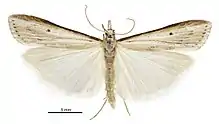Scoparia niphospora
Scoparia niphospora is a moth in the family Crambidae.[3] It is endemic to New Zealand.[1]
| Scoparia niphospora | |
|---|---|
 | |
| Male | |
| Scientific classification | |
| Kingdom: | |
| Phylum: | |
| Class: | |
| Order: | |
| Family: | |
| Genus: | |
| Species: | S. niphospora |
| Binomial name | |
| Scoparia niphospora | |
| Synonyms[2] | |
| |
Taxonomy
This species was described by Edward Meyrick in 1884.[4][2] Meyrick gave a more detailed description of the species in 1885.[5] Meyrick placed this species within the genus Scopaira in 1913.[6] However the placement of this species within Scoparia is in doubt.[1] As a result, this species has also been referred to as Scoparia (s.l.) niphospora.[3]
Description
The wingspan is 26–29 mm. The forewings are light greyish-ochreous, irrorated with white except along the costa. The costa are dark fuscous with a few scattered dark fuscous scales. The veins are somewhat marked with dark fuscous posteriorly. There is a hindmarginal row of black dots. The hindwings are very pale whitish-ochreous. Adults have been recorded on wing in January.[5]
References
- "Scoparia niphospora (Meyrick, 1884)". www.nzor.org.nz. Landcare Research New Zealand Ltd. Retrieved 1 February 2018.
- Dugdale, J. S. (1988). "Lepidoptera - annotated catalogue, and keys to family-group taxa" (PDF). Fauna of New Zealand. 14: 161. Retrieved 1 February 2018.
- Gordon, Dennis P., ed. (2010). New Zealand inventory of biodiversity. Volume two. Kingdom animalia : chaetognatha, ecdysozoa, ichnofossils. Vol. 2. Christchurch, N.Z.: Canterbury University Press. p. 458. ISBN 9781877257933. OCLC 973607714.
- Meyrick, E. (1884). "Descriptions of New Zealand Microlepidoptera. IV. Scopariadae". New Zealand Journal of Science. 2: 235–237. Retrieved 1 February 2018.
- Meyrick, E. (1885). "Descriptions of New Zealand Microlepidoptera. IV. Scopariadae". Transactions and Proceedings of the New Zealand Institute. 17: 68–120. Retrieved 1 February 2018.
- Meyrick, E. (1913). "A revision of New Zealand Pyralidina". Transactions and Proceedings of the New Zealand Institute. 45: 30–51 – via Biodiversity Heritage Library.